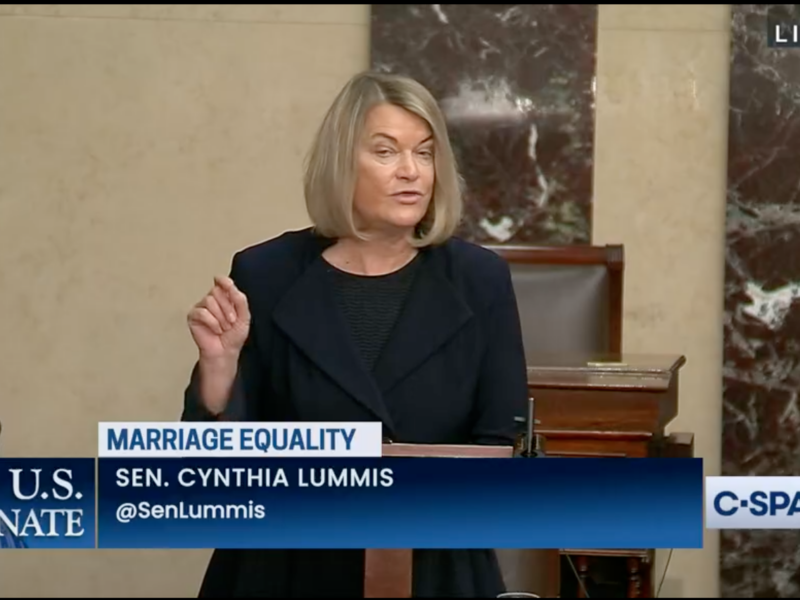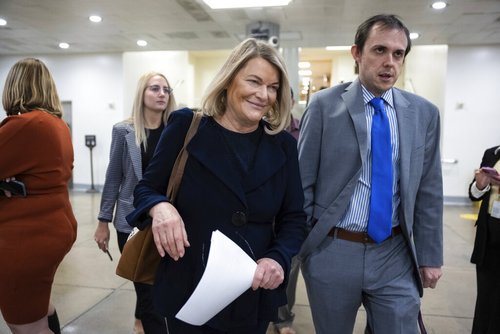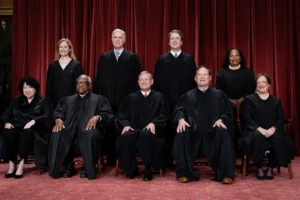With Lummis’ Support, Senate Passes Bipartisan Bill Enshrining Protections for Same-Sex Marriage
The Senator’s vote for the legislation has enraged conservatives in Wyoming
- Published In: Politics
- Last Updated: Nov 30, 2022

Sen. Cynthia Lummis (R-Wyo.) delivers an impassioned speech on the Senate floor defending her vote for the same-sex marriage legislation, noting "we do well by taking this step." (Photo via C-SPAN)
By Jacob Gardenswartz
Special to the Wyoming Truth
WASHINGTON — Lawmakers in the U.S. Senate on Tuesday voted 61-36 to pass legislation enshrining federal protections for same-sex and interracial marriages, a rare bipartisan showing in which Sen. Cynthia Lummis (R-Wyo.) joined 11 other Republicans and all Democrats in support of the bill. Sen. John Barrasso (R-Wyo.), voted against the legislation, citing his longstanding opposition to same-sex unions.
The measure’s passage returns the bill to the U.S. House, where lawmakers must first approve changes made during Senate deliberations before it can be sent to President Joe Biden and signed into law. House leaders have signaled they intend to sign-off on the final text as soon as next week, and Biden has promised to sign the bill “promptly” once it reaches his desk.
“Love is love, and Americans should have the right to marry the person they love,” Biden said in a recent statement after the measure cleared a key Senate hurdle. “I want to thank the Members of Congress whose leadership has sent a strong message that Republicans and Democrats can work together to secure the fundamental right of Americans to marry the person they love.”

That Nov. 16 procedural vote, where Lummis first revealed her support for the legislation, brought the Senator fierce condemnation from conservatives across Wyoming. Yet Lummis has characterized the bill as a compromise, balancing individuals’ rights to equality with others’ religious beliefs.
“For the sake of our nation today and its survival, we do well by taking this step,” Lummis said in remarks on the Senate floor Tuesday. “Not embracing or validating each other’s devoutly held views, but by the simple act of tolerating them.”
A balancing act of individual and religious freedoms, set in motion by Dobbs
Once signed into law, the Respect for Marriage Act repeals the Defense of Marriage Act (DoMA), a 1996 law that defined marriage federally as the union between one man and one woman and denied same-sex couples federal benefits.
Though in 2015 the U.S. Supreme Court effectively rendered DoMA moot with its Obergfell v. Hodges decision and enshrined the right to same-sex marriages nationwide, the recent Dobbs ruling, which overturned the constitutional right to abortion, raised fears that the legality of same-sex marriages also could be in jeopardy. Justice Clarence Thomas wrote in a concurring opinion in Dobbs that the Court “should reconsider” overturning more precedents, including the one which guaranteed marriage equality, thrusting the issue to the top of congressional Democrats’ priorities.
Should Obergfell be overturned, the new measure would not require states to grant marriages to same-sex couples but would prohibit them from not recognizing marriages performed out-of-state on the basis of sex, race or ethnicity.
But the bill also includes several provisions to quell the fears of religious conservatives: ensuring nonprofit religious organizations would not be required to perform or provide goods for same-sex marriages, ensuring such institutions would not lose their tax-exempt status by refusing to recognize gay unions and clarifying that the federal government isn’t required to recognize polygamous marriages. After those additions, the Church of Jesus Christ of Latter-day Saints and the National Association of Evangelicals expressed support for the bill.
Though some Democrats had called for a Senate vote on the measure before the general election, in an effort to force vulnerable Republican Senators to show their cards on a highly-controversial matter, Democratic leaders in the Senate resisted. The decision to wait until after the midterms was championed by Sens. Tammy Baldwin (D-Wis.), the first openly-gay Senator, and Susan Collins (R-Maine), and ultimately proved fruitful for the bill’s supporters.
Speaking to reporters Tuesday, Majority Leader Chuck Schumer (D-N.Y.) grew visibly emotional. “It’s personal to me,” he said shortly before the bill’s passage, noting he wore the same purple tie for the vote as he did at the wedding of his daughter and her wife.
“The bill we are passing today will ensure their rights won’t be trampled upon simply because they are in a same-sex marriage,” Schumer added.
A fierce backlash for Lummis, and personal vote for Cheney
Across the country, support for same-sex marriage reached a record-high 71% last summer, up from 27% when Gallup first asked the question in 1996.
The majority of Wyomingites also back same-sex marriage, according to a 2021 poll by the Public Religion Research Institute, with 58% of Wyoming residents supporting marriage equality and 41% opposed.
Still, the backlash to Lummis’ mid-Nov. vote to proceed with debate on the measure was swift and searing.
“Yesterday’s vote on the ‘Respect for Marriage Act’ sadly saw our own Senator Lummis vote aye,” the Wyoming GOP wrote in a mass email to supporters. “This act threatens religious liberties and is opposed to the Wyoming Republican Party Platform which was ADOPTED UNANIMOUSLY.”
In a statement after that vote, Lummis said her decision to proceed on the bill was “guided by two things – the Wyoming Constitution and ensuring religious liberties for all citizens and faith-based organizations were protected.”
“Striking a balance that protects fundamental religious beliefs with individual liberties was the intent of our forefathers in the U.S. Constitution and I believe the Respect for Marriage Act reflects this balance,” Lummis’ Nov. 16 statement added.
She subsequently explained her stance in an open letter, highlighting that the bill does not create a new federal right to same-sex marriage but rather requires states to recognize marriages from elsewhere.
“If we want the right to drive in other states or exercise our Second Amendment rights, we have to grant respect to other states’ decisions too—otherwise, the constitutional structure put in place by the Founders in 1787 will not work,” Lummis wrote. “That is the fundamental purpose of this legislation.”
Still, Lummis’ GOP detractors were not assuaged: “[I]t seems to me that your profuse language obfuscates rather than clarifies the issues to be addressed in this poorly considered legislation,” Pastor David Holland, vice chair of the Wyoming Republican Party, wrote in a public response.
The Wyoming Pastors Network, a “loose affiliation” of pastors from across the state, posted an open letter to Lummis signed by over 40 pastors claiming the legislation “violates the First Amendment in multiple ways.”
Speaking from the Senate floor Tuesday, Lummis said she’d endured a “painful exercise in accepting admonishment and fairly brutal self-soul searching” because of her vote, something which was “entirely avoidable” had she voted no.
“People of diverse faith, beliefs and backgrounds had to come to terms with each other, had to tolerate the seemingly intolerable about each other’s views, and had to respect each other’s rights even before the Constitution enumerated those rights,” Lummis added. “They had to tolerate each other in order to survive as a nation.”
Earlier this year, outgoing Rep. Liz Cheney (R-Wyo.) also broke ranks to support the bill in the U.S. House, joining 46 other Republicans and all Democrats in the 267-157 vote last July. Her vote came eight years after she first said she opposed gay marriage, putting her at odds with her sister Mary, who identifies as a lesbian and is married to a woman.
But last year, Cheney told “60 Minutes” she was “wrong” to oppose her sister’s union.
Congresswoman-elect Harriet Hageman has thus far dodged questions about her stance on the legislation.
“The issue of gay marriage is something that has already been settled by the Supreme Court and I don’t foresee it being an issue that would come before Congress,” Hageman said over the summer.
Hageman “will examine all legislation that comes before the next Congress and make her decisions at that time,” her campaign manager Carly Miller added.













